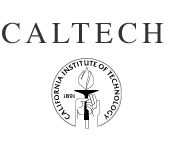|
 In September 1891, Pasadena philanthropist Amos Throop rented the Wooster Block building in Pasadena for the purpose of establishing Throop University, the forerunner of Caltech. In November of that year, Throop University opened its doors to 31 students and a six-member faculty. Throop might have remained just a good local school had it not been for the arrival in Pasadena of astronomer George Ellery Hale. The first director of the Mount Wilson Observatory, Hale became a member of Throop's board of trustees in 1907, and envisioned molding it into a first-class institution for engineering and scientific research and education. Under his leadership Throop's transformation began. In September 1891, Pasadena philanthropist Amos Throop rented the Wooster Block building in Pasadena for the purpose of establishing Throop University, the forerunner of Caltech. In November of that year, Throop University opened its doors to 31 students and a six-member faculty. Throop might have remained just a good local school had it not been for the arrival in Pasadena of astronomer George Ellery Hale. The first director of the Mount Wilson Observatory, Hale became a member of Throop's board of trustees in 1907, and envisioned molding it into a first-class institution for engineering and scientific research and education. Under his leadership Throop's transformation began.
By 1921, Hale had been joined by chemist Arthur A. Noyes and physicist Robert A. Millikan. These three men set the school, which by then had been renamed the California Institute of Technology, firmly on its new course. For the next 76 years, Millikan and his successors—Lee DuBridge, Harold Brown, Marvin Goldberger, and Thomas Everhart—led the Institute as it achieved preeminence in the scientific community. During this time programs were added in geology, biology, aeronautics, astronomy, astrophysics, the social sciences, computer science, and computation and neural systems.
Now serving as president is David Baltimore, who took office in October 1997. Dr. Baltimore came to Caltech after more than 30 years at MIT, where he was a professor of molecular biology and immunology. He also served as founding director of MIT's Whitehead Institute for Biomedical Research and as president of Rockefeller University. He was named chairman of the National Institutes of Health?s AIDS Vaccine Research Committee in 1996, a post he continues to hold concurrent with the Caltech presidency. Dr. Baltimore was a corecipient of the 1975 Nobel Prize in physiology or medicine for his discovery of the enzyme reverse transcriptase. In 1999, he was awarded the National Medal of Science by President Clinton.
You may have run into the work of past Caltech scientists without even knowing it.
If your mom ever told you to take Vitamin C to fend off a cold, you can thank Linus Pauling, the Caltech chemist who discovered the nature of the chemical bond in 1930 (his ideas about vitamins came later). His chemical bond research won him the 1954 Nobel Prize for chemistry. (Pauling also won the Nobel Peace Prize in 1962.)
After an earthquake, news anchors can tell us how relatively shaken up we were, courtesy of the formula that geophysicist Charles Richter devised in the 1920s for measuring the size of Southern California earthquakes. (Later, Richter and fellow Caltech geophysicist Beno Gutenberg would apply the formula to earthquakes throughout the world.)
And if anyone's ever told you to stop acting so "left brain," it's because of the pioneering brain hemisphere research done by Caltech psychobiologist Roger Sperry (another Nobelist).
Other luminaries in our past include Carl Anderson (discoverer of the positron); Clair Patterson (whose work on lead pollution spurred the federal government to impose pollution controls on the auto industry); Henry Borsook (who formulated the Recommended Daily Requirements for Human Nutrition); Theodore von Kбrmбn (father of modern aviation, jet flight, and, indirectly, JPL); and Richard Feynman (the theoretical physicist/Renaissance man whose name was for years practically synonymous with Caltech's).
Источник информации: https://www.caltech.edu
Подразделения:
|





 Обратная связь:
Обратная связь: Пользовательское соглашение
Пользовательское соглашение
 Регистрация посетителей портала
Регистрация посетителей портала Логотипы
Логотипы In September 1891, Pasadena philanthropist Amos Throop rented the Wooster Block building in Pasadena for the purpose of establishing Throop University, the forerunner of Caltech. In November of that year, Throop University opened its doors to 31 students and a six-member faculty. Throop might have remained just a good local school had it not been for the arrival in Pasadena of astronomer George Ellery Hale. The first director of the Mount Wilson Observatory, Hale became a member of Throop's board of trustees in 1907, and envisioned molding it into a first-class institution for engineering and scientific research and education. Under his leadership Throop's transformation began.
In September 1891, Pasadena philanthropist Amos Throop rented the Wooster Block building in Pasadena for the purpose of establishing Throop University, the forerunner of Caltech. In November of that year, Throop University opened its doors to 31 students and a six-member faculty. Throop might have remained just a good local school had it not been for the arrival in Pasadena of astronomer George Ellery Hale. The first director of the Mount Wilson Observatory, Hale became a member of Throop's board of trustees in 1907, and envisioned molding it into a first-class institution for engineering and scientific research and education. Under his leadership Throop's transformation began.